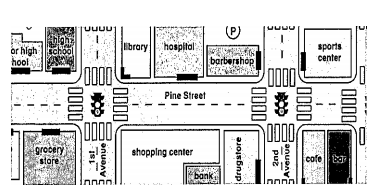Questões Militares Comentadas por alunos sobre preposições | prepositions em inglês
Foram encontradas 133 questões
Resolva questões gratuitamente!
Junte-se a mais de 4 milhões de concurseiros!
Choose the correct option to complete the sentences below.
I. She congratulated m e ______passing the driving test.
II. My parents discouraged me _____ quitting my job.
III. She got married______a foreigner.
IV. Many young people dream______living abroad.
V. The mayor was forced to resign ______ his position.
Choose the correct altemative to complete the excerpt below.
“I agonized _______ whether I wanted to splurge _____a private tour and have a little more autonomy ______ where we went and how long we spent ______ each place, but ultimately went _______ a Gamma Travei group tour.”
(Abridged from: https://www.businessinsider.com.au/visitingchemoby 1-after-the-n...)
Choose the correct option to complete the paragraph below.
Is an autonomous ship a 'ship' in the eyes of the law?
Different defmitions of 'ship' appear in different statutes and conventions, and it has often fallen to judges to decide if a floating object is, or is not, a 'ship'. ______________ , none of the defmitions of'ship' requires that the floating object be manned, generally simply requiring that it be used or be capable of being used in navigation. Whether this is by remote control or fully autonomous would not appear to be a problem in terms of the legal definition of a 'ship'. It appears probable,________________ , that autonomous ships are likely to fali within the legal definition of 'ship' and so will have to comply with the relevant laws and conventions ______________ the laws themselves might require some modification.
(Abridged from SEAWAYS -The International Journal o f the Nautical Inslitute. Dec/2017).
What is Interpol?

Founded in 1923, Interpol is an international police organisation made up of 194 member countries. It is not a police force in the traditional sense – its agents are not able to arrest criminals. Instead, it is more of an informationsharing network, providing a way for national police forces to co-operate effectively and tackle international crime ranging from human trafficking and terrorism to money laundering and illegal art dealing.
The organisation, based in France, operates centralised criminal databases that contain fingerprint records, DNA samples and stolen documents: a treasure trove so valuable that police consulted it 146 times every second in 2017. Interpol’s other main function is to issue notices: alerts to member states for missing or wanted persons. The bestknown of these is the “Red Notice”, a notification that a member state would like someone arrested. States are not obliged to follow these notices, but will often treat them as a warrant for someone’s arrest and extradition. “Diffusions”, which can be issued with less bureaucracy, are another popular way of seeking arrests through Interpol.
Notices and diffusions lie at the heart of the organisation’s recent turmoil. Though Interpol’s constitution explicitly forbids any activities of a political character, activists accuse it of failing to enforce this rule.
(www.economist.com/the-economist-explains/2018/11/22/ what-is-interpol. Adaptado)
Observe the city map.

lt’s correct to say that the